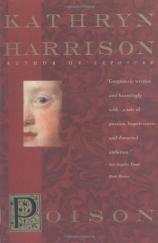Excerpt
Excerpt
Poison

Chapter One
In a year of ample rain, one hectare, carefully tended, would sustain enough mulberry trees to feed about one hundred and forty-four thousand silkworms. The trees' first buds appeared just after Palm Sunday. They unfurled by Whitsun and were in full summer leaf by the time we celebrated the feast of Our Lady. In autumn we pruned the bare branches and with the wood we collected we made more bonfires for Saint John the Baptizer than any other family in Quintanapalla.
Our lives followed those of our trees and our worms. Each year we carried almost seven thousand pounds of leaves to the silk house. Leaves bundled in baskets and bags and yoked to tired shoulders or pushed in the old barrow. Leaves wrapped in a linen and balanced on an upright head, or dragged in a sack along the dry ground so that they got dusty and had to be washed.
I was a child of five years, smaller than other girls my age, small enough that I could walk under my grandfather's table without ducking my head, but I was not so small that I could not carry my share of the mulberry leaves; and, like my father and mother, my grandfather and my sister, I carried leaves from our trees to our worms, bearing them on my head in a basket that was broad and flat like my mother's, except that it was half the size.
The silkworms ate without cease. Day into night into day, we forced them to feed; they paused only to split their skins. After the fourth and final molt, each worm as long and as thick as my grandfather's thumb, they were ready to spin. One hundred and forty-four thousand worms of good quality, vigorous and industrious, could spin almost ninety pounds of silk cocoons, that total including the weight of the worms inside, which we killed by steaming the trays of sleeping cocoons over stones heated by fire and doused with water, smothering the worms in rising clouds of hot vapor. We had to kill them. If we did not, they would turn into silk moths; they would escape by chewing through the silk they had spun.
Each year, just before All Souls' Day, we took our ninety pounds, more or less, of raw silk cocoons from our one hectare to market. There we sold them; and from the market they were carried with the harvests of other silk farmers on a great tumbrel pulled by oxen to the cisterns in Soria, where they were soaked and soaked and soaked again, and then unraveled. The unraveling required the labor of comb girls, who clawed the silk apart with the nails of their middle fingers notched in one, two, three places-notched to the detriment of their lovers' backs, or the flesh of anyone else they might care to touch, themselves included.
After the labor of the worms was thus undone, the silk was ready to be twisted into thread at the throwing mills, also in the city of Soria. In the mill yards the crated unraveled silk was unloaded by the men who worked there, the shining work of our worms thus passing from the hands of maidens to those of swains: from one to the other, like a secret, like a greeting, like a whispered promise of more and better gifts to come. Or so I liked to dream as I fed the worms, for, though I had never seen a twisting mill myself, I knew that its clacking, groaning machines were tended by young men who labored long days for little money, not even a hundred maravedis, a scant handful of coins-barely enough to buy them their suppers and an occasional trinket for a sweetheart, my papa said.
Twisted into hanks of fine, strong thread, the silk was crated again and carried from the mill to the wash works nearby, where it was tied in bags and boiled in soapy water, then rinsed and dried and bleached in fumes of burning sulfur.
From the wash works, the silk was crated one last time and then carried to the dye artists in Epila, whose hands were permanently stained black from endless immersion in pigments; their ears and noses, too, if they were like me and in the habit of absentmindedly scratching an itch. The dye artists made our silk purple, perhaps, or red or green, dropping each white hank into a cauldron of color. I could picture the nearly naked vat boys as they slowly stirred the strands with a pole, sweat running down their thin chests and into their loincloths. For in the dye works with its boiling cauldrons they could wear nothing more, and naked they carried the dripping hanks out to the factory yard's great racks and hung them there to dry.
Woven, then, by the weavers in that same city: each lustrous colored thread held tight by a loom's jumping heddle until it was battened fast to another, made to lie forever between its neighbors--one slender stroke of color after another, placed so as to create a pattern, a shining, dreamlike scene of ever-leaping deer and wheeling birds, of imagined animals following one another, caught in the fabric for all eternity. Or an endless, meditative weave of repeating geometric symmetries: squares inside squares, stripes and circles and crescents, trapezoids and triangles and pyramids of silk.
A year of ample rain. In truth, I cannot remember a year of ample rain, other than the one in which it all arrived between one Sabbath and the next and coursed down the mountain and through our house. But by the end of a tolerably wet season, our worms produced silk sufficient for about forty pairs of hose-a modest accomplishment given the work it took, the efforts of our whole family, though one that grew in my imagination, and in my dreams. Grew until it was enough silk to clothe the grandest assembly the land had ever seen.
Excerpted from Poison © Copyright 2012 by Kathryn Harrison. Reprinted with permission by HarperCollins. All rights reserved.
Poison
- paperback: 336 pages
- Publisher: Harper Perennial
- ISBN-10: 0380727412
- ISBN-13: 9780380727414








